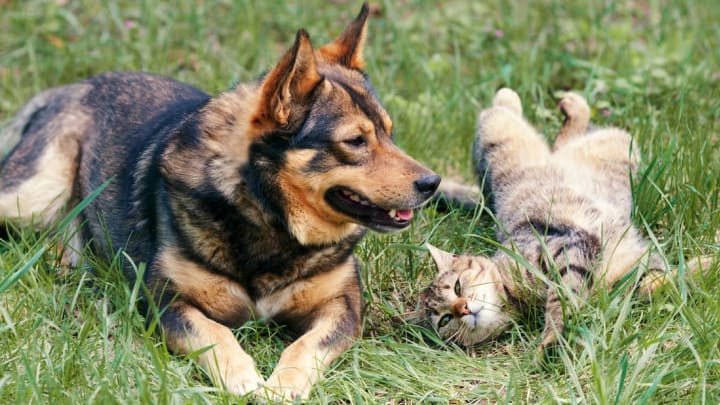Dogs are friendly, cats are smart. This simple, albeit simplistic, dichotomy has been cited—and argued over—by many a pet owner. But still, the question remains: Is it true that felines are more intelligent than their canine counterparts?
We hate to burst the bubbles of all the ailurophiles reading this, but experts say that comparing cat intelligence to dog smarts is like comparing apples and oranges: “Intelligence evolves to solve problems that are recurrent over an evolutionary relevant timescale,” Rosalind Arden, a researcher at the London School of Economics who studies intelligence in people and dogs, tells Mental Floss. “This timescale is not fixed. Cats, who must eat meat, and dogs, who like meat but are more omnivorous, have faced different ecological, survival, and mating problems for a long time. We should therefore expect their cognitive abilities to differ.”
That said, cat cognition is fairly understudied. To test intelligence among animals, scientists need to come up with a study that presents a solvable problem to its non-human subjects; yields a “right” or “wrong” answer; and has a measurable outcome, using criteria like how long, or how many trials, each animal took to solve said problem. And as you can probably imagine, cats are not the easiest subjects to test. (One scholar even said it was easier to work with fish.)
“Since dogs like snacks, we make food-oriented 'tests,''' Arden says. “With cats? Jeepers. Most of them say, 'I'll have mine with the organic double cream on the side, please.’ They are harder to work with. Kudos to those who manage it.”
So far experts know that cats have "object permanence," or the ability to know an object is there even when it goes out of sight—a prime example being a toy they've batted underneath a couch. They also seem to be able to figure out where the item has been moved, even if they aren't privy to the action itself.
Studies also show that felines can discriminate between quantities, follow a human-pointing gesture to find food, respond to their owners' emotions, distinguish between humans using only vocal cues, and figure out simple food puzzles—all similar to dogs. (Unlike dogs, however, cats won't look up at their owners for "help" if they can't solve a puzzle.)
Meanwhile, researchers in Japan recently found that cats may be able to respond to facial expressions, gestures, and human gestures, and discern which food bowl they had already eaten out of, compared to an untouched one, after a 15-minute interval.
However, we still have a long way to go before we figure out what felines are truly capable of—and when we do, we should compare them to other cats instead of dogs.
“I'd bet the house that some cats are smarter than others,” Arden says. "The slog for scholars is to expose those differences with rigorous science, and to show that those differences are reliable, meaning they don't change with the weather, and that they are valid, meaning that the animals with higher test scores are also better at doing things in the real world. That takes a lot of work. We are only at the beginning of figuring out how to test intelligence in other species.”
Have you got a Big Question you'd like us to answer? If so, let us know by emailing us at bigquestions@mentalfloss.com.
